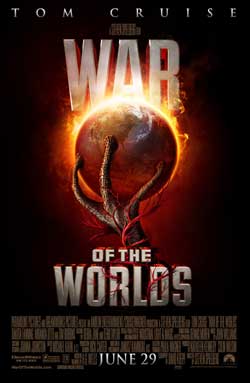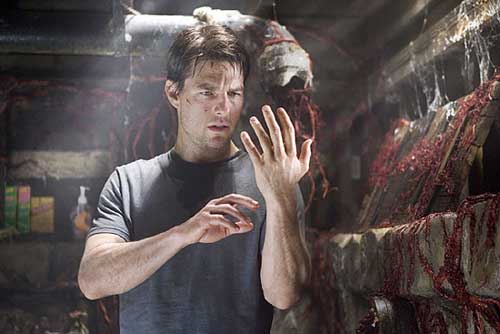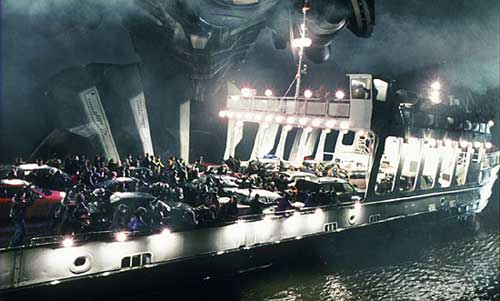 War of the Worlds hits theaters tomorrow. The reviews are popping up – you know that mine was very positive – and so far, as of this writing, Rotten Tomatoes is showing that most of the critics agree.
War of the Worlds hits theaters tomorrow. The reviews are popping up – you know that mine was very positive – and so far, as of this writing, Rotten Tomatoes is showing that most of the critics agree.
Part of what makes the film work so well is David Koepp’s screenplay. Koepp has had a hand in or written the scripts to many of your favorite films: Spider-Man, Panic Room, Jurassic Park, Carlito’s Way. Last week I spoke with him at the WOTW press junket, and he had a lot to spill about the story, the metaphor and more. Be warned – this interview is spoiler heavy. I haven’t bothered to black out the spoiler bits because that’s whole chunks of the interview. Consider skipping this until tomorrow if you want to walk into the film unspoiled.
Q: Were you intimidated to adapt this book?
Koepp: Fortunately he’s dead. I’ve adapted a lot of writers who are alive who have had issues. I wasn’t really intimidated because it’s so good. I never feel a particular responsibility because I’m not taking the book out of print – it’s still available, I’m just adapting it.
My feeling going in was that it’s been done a couple of times and it’s been done really well, so what’s the reason to do it. I felt like the real reason was that no one has taken advantage of the principal virtue, which is that it’s this massive global event told from a narrow point of view. It’s all from the point of view of the narrator, except for this one segment in the middle where he goes to London to talk about his brother. I thought that was going to allow us to make the movie in a way that the movie hasn’t been done before, which is never seeing the global perspective and only seeing it through the eyes of one guy.
And everytime we had a problem I went back to the book and the solution was there. So I wasn’t intimidated, I had it in my corner.
Q: Some readings of the original book see it as Wells commenting on English colonialism.
Koepp: Yeah, I’ll buy that.

Q: How did you bring the political aspects up to date, and how important was it to you to give the film a modern political resonance?
Koepp: What’s amazing is that you don’t have to do anything. Every time the book’s been adapted it became immediately and effortlessly about the politics of the time. At the end of the 1800s it was about what you mentioned, but I also think it was about the fear of the rise of the Kaiser. Then in ’38 it was about American fear of fascism in Europe, early 50s was the Commies are coming to get us and now, with no effort on our part really, it became about – well, people will see it different ways. Some people will think it’s about American fear of terrorism, certainly that’s valid. And I think that elsewhere in the world people might see it as an allegory for Iraq and the fear of an American invasion. Both are, I think, valid interpretations.
But we didn’t have to do much. In fact you’d have to make a hell of an effort to take it out. Which we didn’t.
Q: What changes did you make to the story?
Koepp: Obviously time and place are the big ones. The only other significant change, I think, is the addition of the characters of the children, which I did for a very literal reason: he needed someone to talk to. In the book the narrator travels alone, which is fine in a book because you have access to his thoughts and feelings. But in a movie all you have is what they say and what they do, and so I needed someone to travel with him.
Q: It’s interesting that you say “fear of an American invasion.” Do you think that’s how it will play overseas?
Koepp: I’m smart enough to know that I don’t know. But I think that it might. Wells was writing about the end of British imperialism, but he was a smart enough writer that to hide his metaphor he flipped it and made the British the invaded and not the invaders. This film could certainly be read this way.
Q: What happened to the son in the last half of the movie?
Koepp: He was scurrying through the underbrush! What his character needed to do was set out on his own, like a teenager, probably get his ass kicked and return older and wiser. I figure that’s what he did, and the fact that he did it offscreen is just because it wasn’t his movie, it was Tom’s. And we were sticking to a narrow point of view?
Q: The ending – was there ever talk of not making it as happy and having only Tom and Dakota survive?
Koepp: No, I saw early on that it’s a journey, and it’s like The Searchers I thought. Go out, keep the kids alive, and bring them back. Except that he gets to go in the house and Ethan didn’t get to go in the house. Initially I had him not going in the house, but it just seemed preposterous. My God, there’s no water and food out there – you don’t have to rekindle your marriage, but couldn’t you let him inside to take a shower? I felt that that was what the story was. The story was to take them from here and bring them to the mom.

Q: Why did you choose Boston?
Koepp: Well, first of all that’s where mom is. You have to go somewhere but you don’t know what’s safe ,you have no information. What you know is that you’ve got these kids desperate to see their mother, you can’t handle them – let’s go to Boston. It’s as good a plan as any.
I picked it as opposed to any other location because I wanted it to be a place that had some antiquity. Just as the Ironbound section of Newark had this great, rusty metal look to contrast with the technological sophistication. And Boston’s old, it’s about the birth of the country. I thought it would work.
Q: How much thought did you give to the motivation of the aliens? We never learn why they’re here in the movie, but did you have a backstory?
Koepp: A lot, but it’s not in the movie and it wasn’t in the script either. I figured they came for water. Most wars are about pretty simple things. They seem to have a problem with us but not our planet, so I guess they want to stay here and would prefer that we don’t hang around. Once we set up the rule of, If Ray doesn’t see it we can’t see it and if Ray doesn’t know it we can’t know it, then you have to abide by that rule. Since the aliens showed up and were not really interested in negotiation, they were just asking us to die, I don’t think they would share a lot of information.
Q: When you’re writing the big sequences, how much thought are you giving to what the FX guys have to do?
Koepp: I write those sequences in great detail and then they of course get modified as the director works with it and the FX guys comment on it. What’s troubling about FX is, like if there’s a person I felt competitive with on the movie it’s Dennis Muren. I know he’s going to make these tripods and they’re going to be really fucking good, and he’s going to win a tenth Oscar – I’ve been down this road with him before, where I had to compete with his dinosaurs and all I had was the people. So I thought, instead of a big cast, where you throw stars at it, what if I go as small as possible. I know his work and that aspect of the story is going to be gigantic and be good, so what if I go microcosm? Make it just these three characters, just a parent and his children because that drama is so small and so intense. That was one thing I was trying to do.
Q: One of the things that people had been speculating about before the film came out was how you were going to end it. The original ending is so well known that there was thought you might try a new concept. What made you stick with the original ending?
Koepp: Because it worked. Because it’s right. It’s the ending of the book. The plot is that aliens come, they fight for a while and bacteria kills them. The story is a dad who will do really nothing for his children who becomes a dad who will do anything for them, including die and kill. That’s the story of the movie and I think the story is ended well and appropriately. Since we weren’t telling the story of how some plucky scientist figured out how to get the bomb in the computer of the mothership or some shit like that, why not just stick with Wells’, which was pretty good.
Q: We live in this weird time where people are really interested in getting their hands on scripts in advance. The Batman script leaked, script reviews end up online before a frame of film is shot, what’s your take on that? How does it affect you as a screenwriter?
Koepp: It’s annoying because it limits your ability – it makes you think twice about experimenting, about trying something that might not work. I think it’s like at a basketball game when they’re shooting a free throw and everybody behind them is going like this [waves arms]. It’s a little distracting, but it’s a small price to pay for free speech. If you really don’t want them to get your script then you should try a little harder to keep the script to yourself. We kept this one under wraps, so it’s not impossible. I think pretty much though once it gets to an agency it’s going to be everywhere. And if you’re not comfortable with that, find another.
Q: This film is really dark. It’s almost the anti-Independence Day. Was that the intention from the beginning?
Koepp: I think so. The story is dark. I chose to enhance some of the darkness. I think at one point Steven was saying that great tragedies tend to bring out the best in human nature. I said that’s true and I went home and wrote the carjacking scene. I felt like, you’re going to find the best and you’re going to find the sunshine because you’re a hopeful and optimistic person. I’m going to represent the dark side and hopefully somewhere in between the balance is struck.
These situations do bring out the best in people but they also bring out the worst. You see both.

Q: Did you know Tom Cruise was going to be the star?
Koepp: Yes. He was there before I was. Which is fun because when you know the star and they have a distinctive persona you can either write for it or write against it. It’s always nice to have something to react to. I thought that he’s played so many people who are capable and good at what they do, let’s write somebody incapable and bad at what they do, let’s see what he does with that.
Q: How does having directed some films affect you as a writer?
Koepp: You’re a little more sympathetic. You know a little more about movies. I’m alert to any possible way to tell something with a picture instead of dialogue. That helps a lot. I’ve mellowed a little bit. I used to get upset if it didn’t turn out the way I wrote it, but then you realize that their job is to interpret, not to record. Only a hack will just shoot what you wrote. Somebody who cares develops it into your own thing.
Q: Did you visit the set?
Koepp: Sometimes. But I don’t like to go because they are interpreting and they should do it in private. Apparently I have a tendency to sit in a chair and wince.